

Trials and errors: Why science is failing us. This article was taken from the February 2012 issue of Wired magazine.
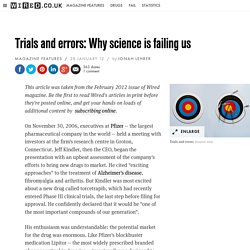
Be the first to read Wired's articles in print before they're posted online, and get your hands on loads of additional content by subscribing online. On November 30, 2006, executives at Pfizer -- the largest pharmaceutical company in the world -- held a meeting with investors at the firm's research centre in Groton, Connecticut. Jeff Kindler, then the CEO, began the presentation with an upbeat assessment of the company's efforts to bring new drugs to market. He cited "exciting approaches" to the treatment of Alzheimer's disease, fibromyalgia and arthritis. But Kindler was most excited about a new drug called torcetrapib, which had recently entered Phase III clinical trials, the last step before filing for approval. His enthusiasm was understandable: the potential market for the drug was enormous. Down the Rabbit Hole – the scottbot irregular. WHEREIN I get angry at the internet and yell at it to get off my lawn.
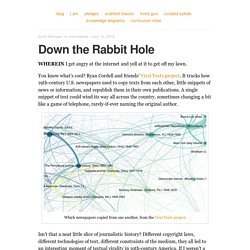
You know what’s cool? Ryan Cordell and friends’ Viral Texts project. It tracks how 19th-century U.S. newspapers used to copy texts from each other, little snippets of news or information, and republish them in their own publications. A single snippet of text could wind its way all across the country, sometimes changing a bit like a game of telephone, rarely-if-ever naming the original author.
Biotech in the Garage. Much like the costs of sequencing the human genome,1 the cost of founding a biotech startup is dropping precipitously.2 If current trends continue, biotech companies will soon be founded in garages, funded off their founders’ credit cards.
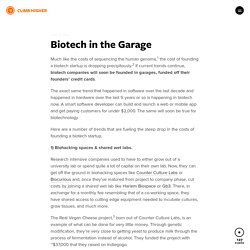
The exact same trend that happened in software over the last decade and happened in hardware over the last 5 years or so is happening in biotech now. A smart software developer can build and launch a web or mobile app and get paying customers for under $2,000. The hitchhiker’s guide to solving problems - Slashie. A postdoc-organized symposium on the sustainability of the scientific endeavor. The dangers of intermediate targets: IQ, cholesterol, and 99%-ile latency. Most real-world problems are big enough that you can’t just head for the end goal, you have to break them down into smaller parts and set up intermediate goals.

Does the Scientific Method need Revision? — Starts With A Bang! Theoretical physics has problems.
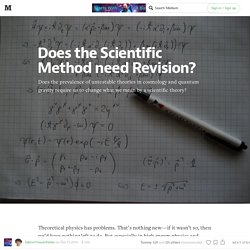
That’s nothing new — if it wasn’t so, then we’d have nothing left to do. But especially in high energy physics and quantum gravity, progress has basically stalled since the development of the standard model in the mid 70s. Yes, we’ve discovered a new particle every now and then. Statistics: P values are just the tip of the iceberg. There is no statistic more maligned than the P value.
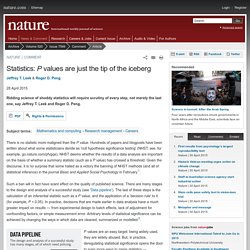
Hundreds of papers and blogposts have been written about what some statisticians deride as 'null hypothesis significance testing' (NHST; see, for example, go.nature.com/pfvgqe). Science fiction? Why the long-cherished peer-review system is under attack. Mathematicians have been studying the number pi for thousands of years, so it might seem startling to learn that a gentleman in Athens, Wisconsin suddenly changed its value.
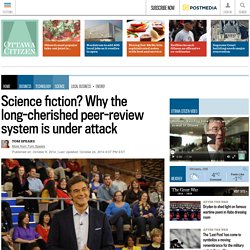
His revised pi is a bit bigger than the one everyone else uses. And it stops after 12 digits instead of running on forever. To any trained mathematician, this isn’t even worth a second look. It’s the work of an amateur who doesn’t understand pi, the ratio of the circumference of a circle to the diameter. But his paper, published in a fake science journal that will print anything for a fee, now shows up in Google Scholar, including footnotes citing himself, himself, himself and himself again. Google Scholar is a search engine that looks for scientific articles and theses, the meat and potatoes of scientific literature. But Google Scholar is not discerning. Again, that’s an eye-roller for anyone in the physics business, yet there it is in a search of scholarly journals, muddying up the intellectual waters. Can the wave function of an electron be divided and trapped? Electrons are elementary particles — indivisible, unbreakable.

But new research suggests the electron's quantum state — the electron wave function — can be separated into many parts. That has some strange implications for the theory of quantum mechanics. PROVIDENCE, R.I. [Brown University] — New research by physicists from Brown University puts the profound strangeness of quantum mechanics in a nutshell — or, more accurately, in a helium bubble. Experiments led by Humphrey Maris, professor of physics at Brown, suggest that the quantum state of an electron — the electron’s wave function — can be shattered into pieces and those pieces can be trapped in tiny bubbles of liquid helium. In quantum mechanics, particles do not have a distinct position in space. Who Really Found the Higgs Boson - Issue 18: Genius. To those who say that there is no room for genius in modern science because everything has been discovered, Fabiola Gianotti has a sharp reply.
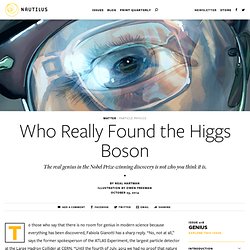
“No, not at all,” says the former spokesperson of the ATLAS Experiment, the largest particle detector at the Large Hadron Collider at CERN. “Until the fourth of July, 2012 we had no proof that nature allows for elementary scalar fields. So there is a lot of space for genius.” She is referring to the discovery of the Higgs boson two years ago—potentially one of the most important advances in physics in the past half century. AAAS - Blocking Access to the Scientific Literature Even When They Say It Is "Free" [1404.3757] Inheritance patterns in citation networks reveal scientific memes. I accidentally started a Wikipedia hoax.
Organic synthesis: The robo-chemist. Genomics. Press Button. Imagine this as a synthetic biologist.
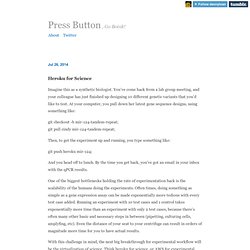
You’ve come back from a lab group meeting, and your colleague has just finished up designing 10 different genetic variants that you’d like to test. At your computer, you pull down her latest gene sequence designs, using something like: THE LAST DAYS OF THE POLYMATH. People who know a lot about a lot have long been an exclusive club, but now they are an endangered species. Edward Carr tracks some down ... From INTELLIGENT LIFE Magazine, Autumn 2009 CARL DJERASSI can remember the moment when he became a writer. It was 1993, he was a professor of chemistry at Stanford University in California and he had already written books about science and about his life as one of the inventors of the Pill. BBC staff told to stop inviting cranks on to science programmes. “Science coverage does not simply lie in reflecting a wide range of views but depends on the varying degree of prominence such views should be given.” The Open Journal by arfon.
Cosmology: Unearthing a 13th-century multiverse. ONE thing that irks this Babbage is the view that if schools simply focused on science, technology, engineering and mathematics (STEM)—at the expense of frivolous “non-scientific” subjects—then a model 21st-century workforce would magically materialise. The Control Group Is Out Of Control. Allan Crossman calls parapsychology the control group for science. Protocols.io - Life Sciences Protocol Repository by ZappyLab. Protocols. Software Sustainability Institute. By Ian Gent, Professor of Computer Science, University of St Andrews.
About - Algorithmia. Reinventing Explanation. Open Science Framework.